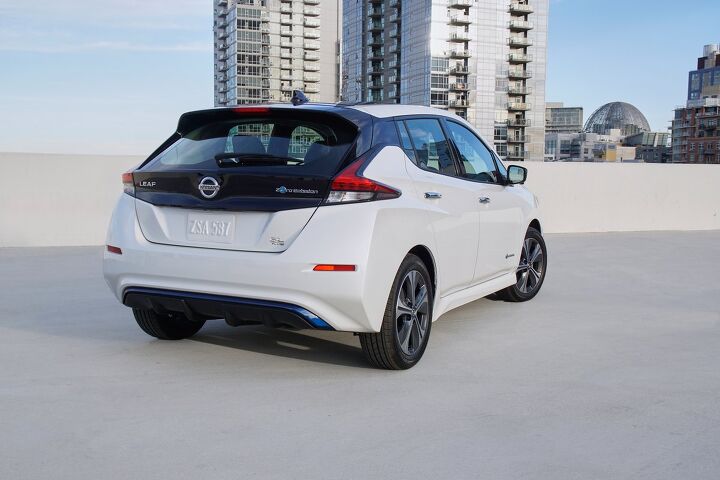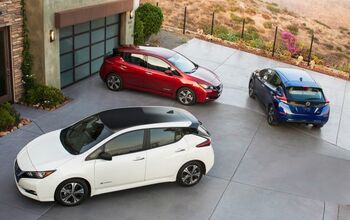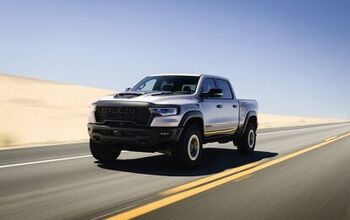Nissan Leaf Rumored for Discontinuation [UPDATED]

In 2010, Nissan launched the first globally-marketed electric vehicle in history. Known as the Leaf, the model offered a paltry 73 miles between charges when it was introduced. But deserves loads of credit for being a useful, friendly runabout that avoided many of the strange design choices other manufacturers leveraged to set their EVs apart. Reviewers frequently praised the Nissan Leaf as a great second car for running errands, noting that it was both comfortable and had enough space to swallow up most items you’d want to snag on a trip into town.
But it arguably came too soon. The EV arrived shortly before the Toyota Prius was to enjoy record-breaking sales and was likely targeting the same kind of customers. Being first also meant that Nissan was running with outdated battery technologies it had to develop itself by the time the rest of the industry joined the all-electric party. The automaker did what it could, and even gradually boosted the Leaf’s range to a more-useful 212 miles with the aid of an optional 60 kWh battery pack. However, it was frequently viewed as lagging behind in terms of technology and is reportedly on deck for discontinuation.
It’s a little tragic to see it go, especially considering Nissan was one of the only automakers putting its money where its mouth was in the early days of electrification. Governments and environmentalists had been clamoring for EVs since the late 1990s (and before), claiming they would help save the world from certain doom. But there weren’t a lot of takers when the Leaf hit the global market. In the United States, Nissan moved just 9,674 examples in 2011 and would find it impossible to break 20,000 deliveries until 2013. Unfortunately, the model peaked early in 2014, seeing 30,200 sales at its all-time high.
Since then, the vehicle has teetered between 18,000 and 7,000 units annually despite seeing meaningful improvements nearly every single year. For the sake of comparison, Toyota’s Prius Hybrid could count on at least 100,000 deliveries in the U.S. between 2005 and 2017, while enjoying a four-year stretch in the middle where it averaged over 200,000 units per year.
We can blame Toyota for having already cornered the eco market or Tesla for introducing the Model S roughly a year after Nissan put the Leaf on sale. But the big issue seems to be that the industry wasn’t quite ready to field mainstream EVs at an affordable price. As the electric car market matured, most of the action was focused on luxury brands. While plenty of those have been colossal flops, they offered powertrains and charging capabilities that the Leaf couldn’t really compete with. This made it a niche vehicle for people who don’t need to cover a lot of ground, like EVs for something other than the image, and can manage the brunt of their charging needs at home. In fact, the Leaf’s charging capabilities are still seen as lacking — as its CHAdeMO connectors aren’t compatible with some of the fast-charging stations that have cropped up in recent years (especially in the West).
Worse still is that when direct competition finally did arrive, more than a few Leaf rivals came with ranges and charging capabilities that made the comfortable and cargo-friendly Nissan less appetizing. While some of these also came with spicier pricing (e.g. Tesla Model 3), others managed to do so without breaking the bank (e.g. Chevrolet Bolt).
According to Automotive News, Nissan is done trying to sell the Leaf and will soon be ending production. It’s long been assumed that the model would never recoup the development expenses required to build it. But the manufacturer isn’t pulling the plug on EVs, it’s viewing the Leaf as an educational endeavor and will only be doubling down on electrification moving forward.
From AN:
But even as Nissan closes the book on its first plunge into mass-market electrification, the company is gearing up for a second act. The Japanese automaker is making a nearly $18 billion bet on electrification, delivering 15 battery-electric models globally by 2030.
The new campaign undoubtedly builds on the lessons learned from the Leaf.
“With EVs projected to be 40 percent of Nissan’s U.S. sales volume by 2030, we will offer a lineup of electric vehicles in a variety of segments to meet the growing demands of American customers,” [Nissan spokesman Brian Brockman] said.
The first of those vehicles — the Ariya compact crossover — arrives stateside in the fall.
Nissan could replace the Leaf with a coupelike crossover, which the automaker teased last year in a sporty concept called the Chill-Out. It uses Nissan’s CMF-EV platform and features a dual-motor all-wheel-drive system called e-4orce.
The outlet goes on to note that Nissan leadership (especially the defamed Carlos Ghosn) had originally envisioned the Leaf as a way to beat the Toyota Prius at its own game. By jumping straight to all-electric propulsion, the company assumed it would gain a massive lead over the rest of the industry. Obviously, that’s not how things played out and many important lessons have been learned since then. Nissan has been cultivating relationships with battery suppliers, rather than continuing to develop its own, and will be working on ways to spread investment spending around in a way that benefits the entire lineup.
A formal announcement about the Leaf’s discontinuation is expected to manifest within the next few weeks. However, Nissan has not confirmed anything about the model’s future at this juncture.
UPDATE: Nissan has reached out and said no formal announcement is planned, providing this quote:
“We are seeing renewed interest in LEAF with the increased demand for EVs and its overall value proposition. Since its launch, LEAF has consistently delivered strong customer satisfaction and new buyers to Nissan. With EVs projected to be 40 percent of Nissan’s U.S. sales volume by 2030, we will offer a lineup of electric vehicles in a variety of segments to meet the growing demands of American customers. This includes an attainable, value-focused model like LEAF, which continues Nissan’s focus for making EV technology available to as many consumers as possible.”
[Images: Nissan]

A staunch consumer advocate tracking industry trends and regulation. Before joining TTAC, Matt spent a decade working for marketing and research firms based in NYC. Clients included several of the world’s largest automakers, global tire brands, and aftermarket part suppliers. Dissatisfied with the corporate world and resentful of having to wear suits everyday, he pivoted to writing about cars. Since then, that man has become an ardent supporter of the right-to-repair movement, been interviewed on the auto industry by national radio broadcasts, driven more rental cars than anyone ever should, participated in amateur rallying events, and received the requisite minimum training as sanctioned by the SCCA. Handy with a wrench, Matt grew up surrounded by Detroit auto workers and managed to get a pizza delivery job before he was legally eligible. He later found himself driving box trucks through Manhattan, guaranteeing future sympathy for actual truckers. He continues to conduct research pertaining to the automotive sector as an independent contractor and has since moved back to his native Michigan, closer to where the cars are born. A contrarian, Matt claims to prefer understeer — stating that front and all-wheel drive vehicles cater best to his driving style.
More by Matt Posky
Latest Car Reviews
Read moreLatest Product Reviews
Read moreRecent Comments
- Lorenzo This car would have sold better if there was a kit to put fiberglass toast slices on the roof.
- Lorenzo The Malibu is close to what the 1955 Bel Air was, but 6 inches shorter in height, and 3 inches shorter in wheelbase, the former making it much more difficult to get into or out of. Grandma has to sit in front (groan) and she'll still have trouble getting in and out.The '55s had long options lists, but didn't include a 91 cubic inch four with a turbo, or a continuously variable transmission. Metal and decent fabric were replaced by cheap plastic too. The 1955 price was $1765 base, or $20,600 adjusted for inflation, but could be optioned up to $3,000 +/-, or $36,000, so in the same ballpark.The fuel economy, handling, and reliability are improved, but that's about it. Other than the fact that it means one fewer sedan available, there's no reason to be sorry it's being discontinued. Put the 1955 body on it and it'll sell like hotcakes, though.
- Calrson Fan We are already seeing multiple manufacturers steering away from EVs to Hybrids & PHEVs. Suspect the market will follow. Battery tech isn't anywhere close to where it needs to be for EV's to replace ICE's. Neither is the electrical grid or charging infrastructure. PHEV's still have the drawback that if you can't charge at home your not a potential customer. I've heard stories of people with Volts that never charge them but that's a unique kind of stupidity. If you can't or don't want to charge your PHEV then just get a hybrid.
- AZFelix The last time I missed the Malibu was when one swerved into my lane and I had to brake hard to avoid a collision. 1 out of 5⭐️. Do not recommend.
- 2ACL I won't miss it; it was decent at launch, but in addition to the bad packaging, GM did little to keep it relevant in the segment. I'd prefer that another domestic automaker doesn't just give up on the mainstream sedan, but unlike some of Ford's swan songs, the Malibu made an indifferent case for why they should live.




































Comments
Join the conversation
I blame the dealers. Back in 2021 we looked long and hard at getting a Leaf when we decided to add another electric car to our fleet. Unfortunately the local Nissan dealers had some incredibly aspirational views on pricing and out the door prices were within striking distance of what we ended up buying- a Tesla 3 midrange.
Nissan had managed to sell 500,000 Leafs worldwide by this month two years ago, of which 148,000 were in the USA. Plus the Nissan Renault Alliance has had the Renault Zoe EV city car since 2012, and it's been the category leader for years in Europe. Since 2018, both have shared some hardware. In the grand and glorious USA, where nobody pays the slightest attention to what other people overseas think, because not being American, they're automatically wrong anyway, a Nissan Leaf might be a joke. The urban cowboy bro with an F250 that can tow a house off its foundation and up the side of a sheer cliff can sneer all they like, but it's highly unlikely that Nissan has lost money globally on the Leaf. The world is not the USA, and is becoming even less so every day, as Big Daddy Biden rushes around trying to shore up the economic colonies to toe the US line, which is looking a bit bedraggled these days. As these comment pages show, one half of America regards the other half as dolts, and the feeling seems mutual; due to US media reach, the rest of the world knows that USA is in social trouble, spends half its national budget on Deefense, and cannot be bothered to repair its infrastructure or give its citizens basic health care. Every damn thing is monetized like BMW is trying to do with heated seats. And the befuddled masses croak:"The free market solves everything!" Like putting tens of thousands of people into homelessness when sky high rent and groceries are beyond reach for so many. So I highly doubt Nissan execs are exclusively focused on making the Leaf (or its CUV addition) acceptable for America. They have other fish to fry, other customers to satisfy. Let the Musker sell Teslas to the Poleaxed Twitterati of America, while they concentrate on making a more affordable EV for the remainder of the world, one that doesn't need constant over the air updates, and just works as designed.